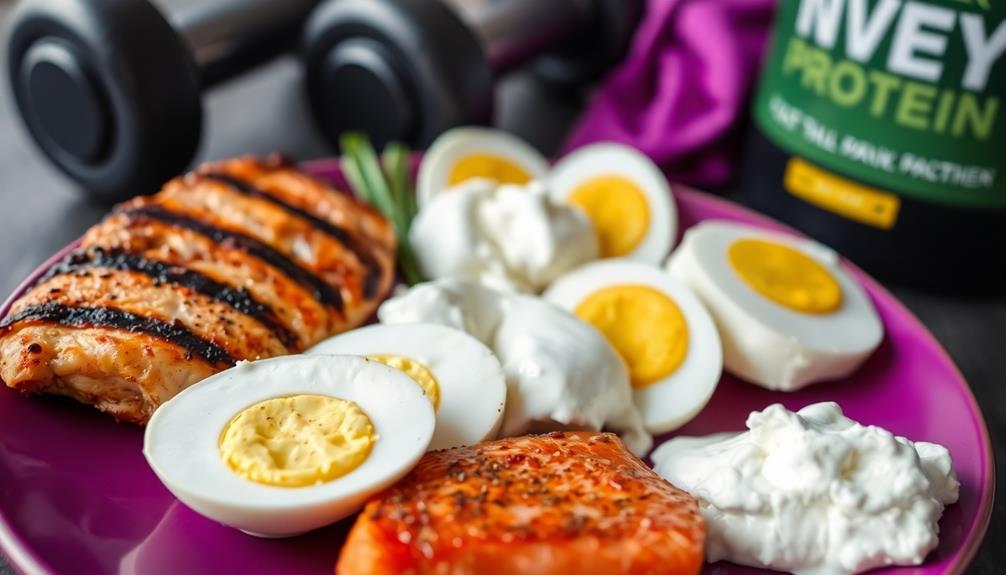Choosing the right protein after your workout is essential for muscle repair and growth. You'll find several options to support your recovery. Whey protein offers quick absorption, while casein provides a slow release of amino acids. Egg white protein is easily digestible and rich in leucine. Lean chicken breast delivers high-quality protein with low fat content. Greek yogurt combines protein with probiotics for added benefits. Salmon provides protein along with omega-3 fatty acids. Plant-based protein powders offer alternatives for those with dietary restrictions. Each option has unique advantages, and understanding their properties can help you optimize your post-workout nutrition strategy.
Core Insight
- Whey protein provides rapid absorption and all essential amino acids for immediate muscle support post-workout.
- Casein protein releases amino acids gradually, making it ideal for prolonged muscle recovery overnight.
- Egg white protein offers complete amino acids and medium absorption, suitable for lactose-intolerant individuals.
- Lean chicken breast is a versatile, high-quality protein source rich in leucine for muscle growth and repair.
- Greek yogurt combines quick-absorbing protein with probiotics, supporting both muscle recovery and digestive health.
Whey Protein
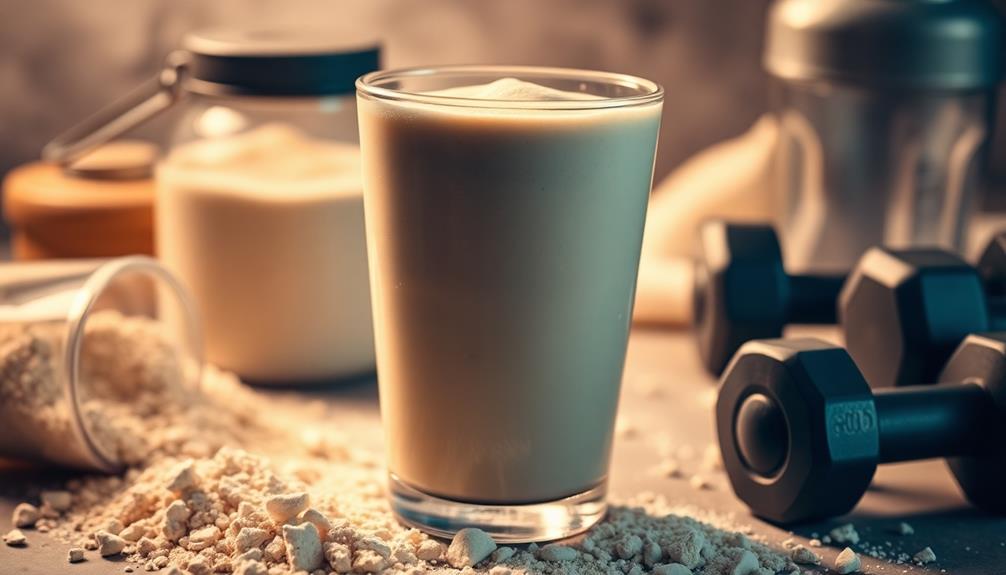
Whey protein is an excellent choice for repairing muscles after a workout. It contains all the essential amino acids your body needs to grow and recover. When you have whey protein after exercising, your body absorbs it quickly to immediately support your muscles. Fitness experts suggest choosing whey protein powders with 24-25g of protein per serving. Some products offer up to 26g of protein and an average of 5.5g of branched-chain amino acids (BCAAs) in each serving.
You can find whey protein concentrate, isolate, and hydrolysate. Concentrate is the most common and affordable. Isolate has more protein and less fat. Hydrolysate is pre-digested, so your body absorbs it even faster.
Whey protein comes in many flavors and types, like powders, bars, and ready-to-drink shakes. For the best results, try to have 20-30 grams of whey protein within 30 minutes after your workout. This helps your body make the most of the protein to start your recovery.
Casein Protein
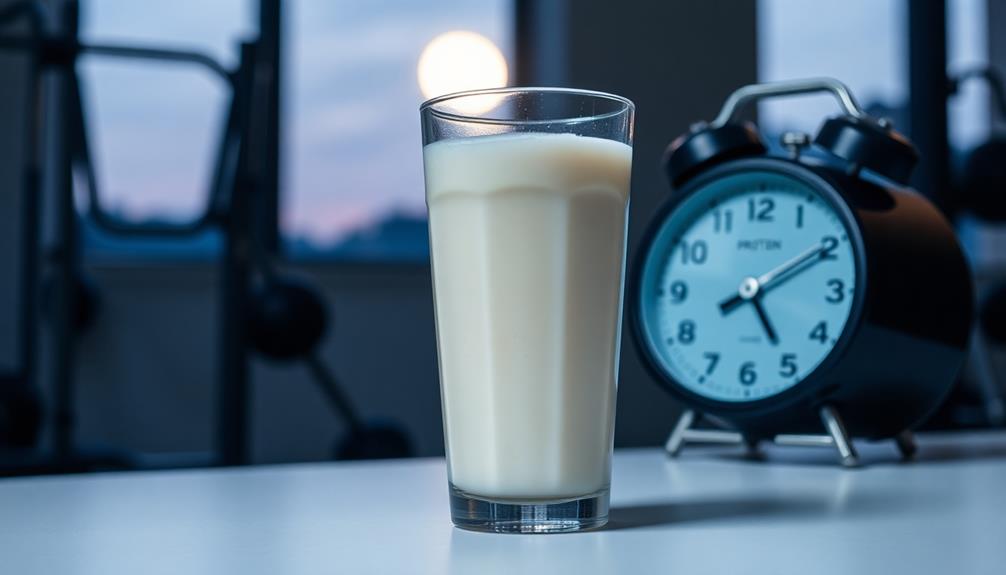
Casein protein is a slow-digesting protein that comes from dairy products like milk, yogurt, and cheese. It releases amino acids gradually into your bloodstream, which is different from whey protein's quick absorption. This sustained release makes casein a great option for recovery after workouts, especially before bed.
When you eat or drink casein protein, it turns into a gel in your stomach. This slows down digestion, so your muscles get a steady supply of amino acids for hours. Casein is high in an amino acid called glutamine, which helps your muscles recover and supports your immune system.
For the best results, you can mix fast-acting whey protein right after your workout with casein protein later on or before sleep. This combination gives your muscles protein to repair and grow both quickly and over an extended period of rest.
Egg White Protein
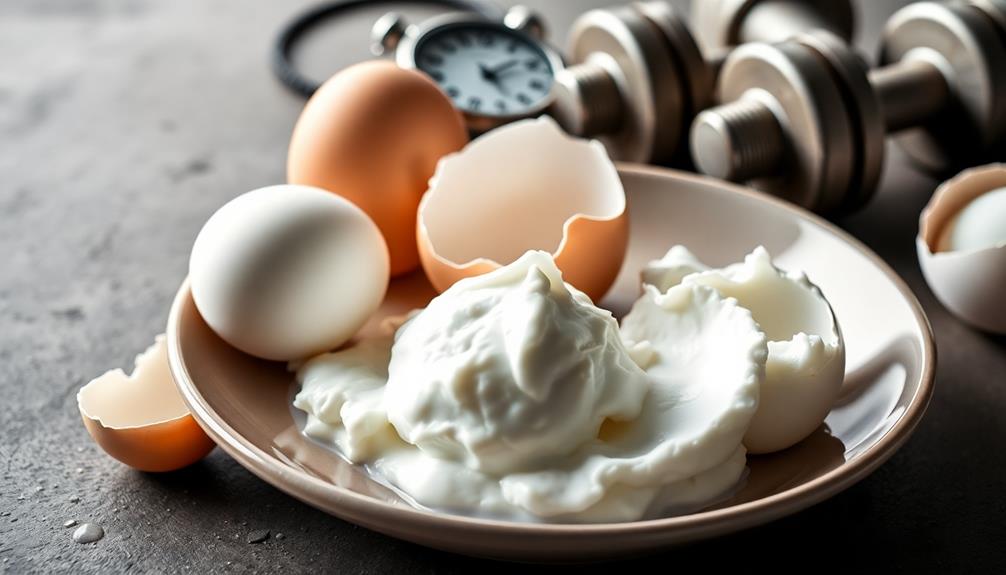
Egg white protein is a top-notch choice for repairing muscles after a tough workout. It's a complete protein, meaning it has all the essential amino acids your body needs. Plus, it's easy to digest and packed with leucine, which is crucial for building muscle.
Egg white protein powder is a great option if you're lactose intolerant or sensitive to dairy. It's low in fat and carbs, so it fits well into many diets.
When you have egg white protein after exercising, it helps fix damaged muscle tissue and supports muscle growth. It's absorbed at a medium speed, giving your muscles a steady supply of amino acids. This makes it perfect for both immediate and long-term muscle recovery.
Lean Chicken Breast
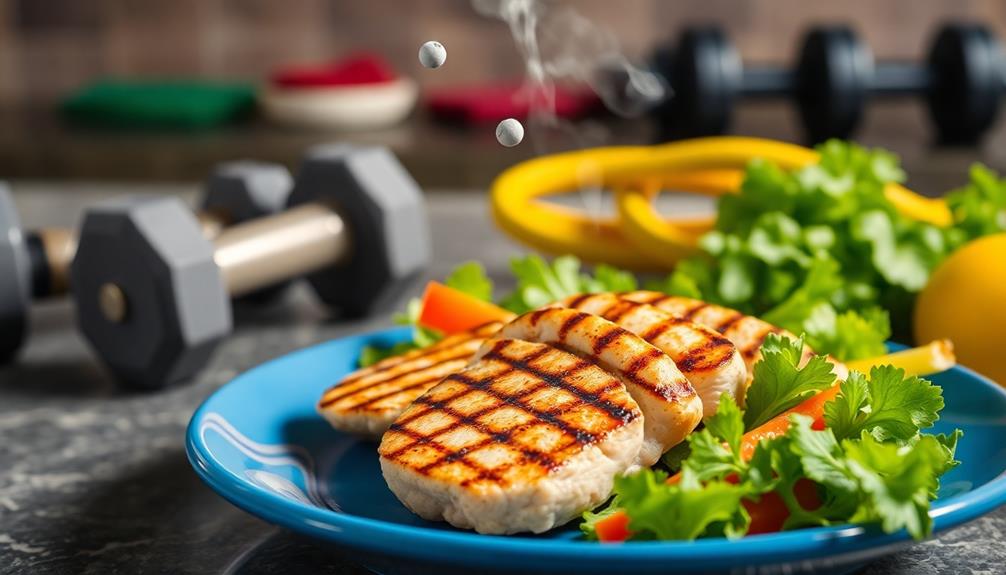
Lean chicken breast is a great protein source for athletes and fitness lovers. It's full of high-quality protein that's easy to digest and low in fat. A small serving gives you about 26 grams of protein, which helps you recover after a workout. Chicken breast has lots of important amino acids, like leucine, that help your muscles grow and repair.
It's also easy to cook chicken breast in different ways, like grilling or baking, for a quick and healthy meal after exercising. Plus, it has vitamins and minerals that support your overall health. When buying chicken breast, choose skinless options to keep the fat content low and get the most protein.
Greek Yogurt
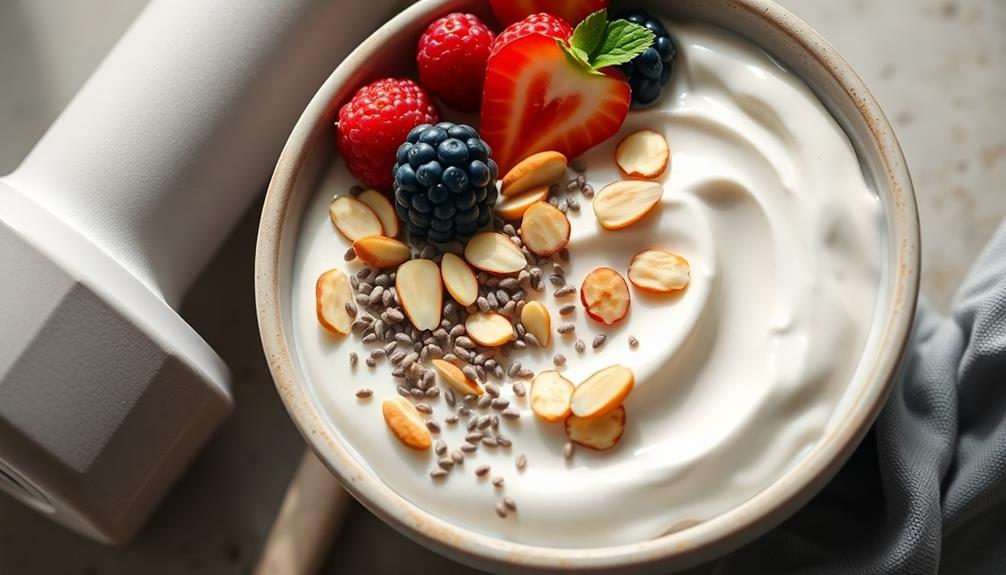
Greek yogurt is a creamy alternative to meat-based proteins for after your workout. It has a lot of high-quality protein, about 20 grams per cup. Your body absorbs this protein quickly, which is great for repairing and growing muscle. Like HMB supplements, eating Greek yogurt regularly can help your muscles recover and grow. It's important to think about when you eat it for the best results.
Good things about Greek yogurt:
- Has all the proteins your body needs
- Lots of calcium for strong bones
- Has probiotics that are good for your gut
- Low in lactose, so it's easier to digest
How to eat it:
- Mix it with fruits and nuts for a balanced snack
- Add it to smoothies to make them creamier
- Use it as a base for dips high in protein
Greek yogurt is easy to add to your post-workout routine because you can use it in many ways. It's also a good choice if you want to eat less meat but still get enough protein. Just remember to choose plain Greek yogurt so you don't get extra sugar.
Salmon
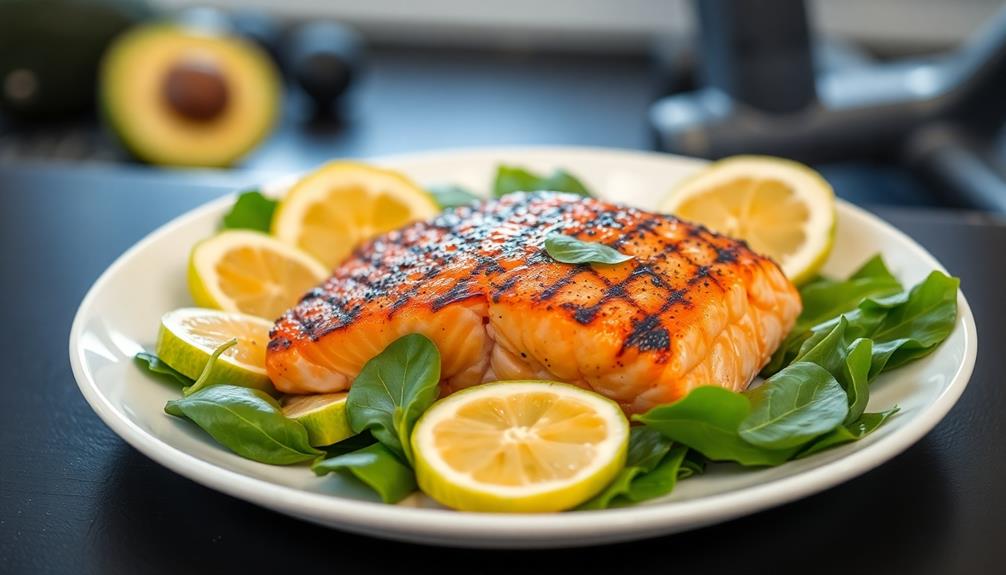
Salmon is an excellent choice for a post-workout meal. It has a lot of high-quality protein, about 22 grams in a 3-ounce serving. Salmon also has omega-3 fatty acids, which can help reduce inflammation and repair muscles. If you follow a ketogenic diet, salmon is a great option because it's low in carbs and high in healthy fats.
When planning your post-workout meal, think about adding salmon. You can grill, bake, or pan-sear it for a quick and easy meal. Serve it with brown rice or sweet potatoes for complex carbohydrates. Add some vegetables for extra nutrients, too.
Salmon is very versatile. You can make it ahead of time and eat it cold in salads or sandwiches. This makes it a convenient choice for busy athletes.
Plant-Based Protein Powders
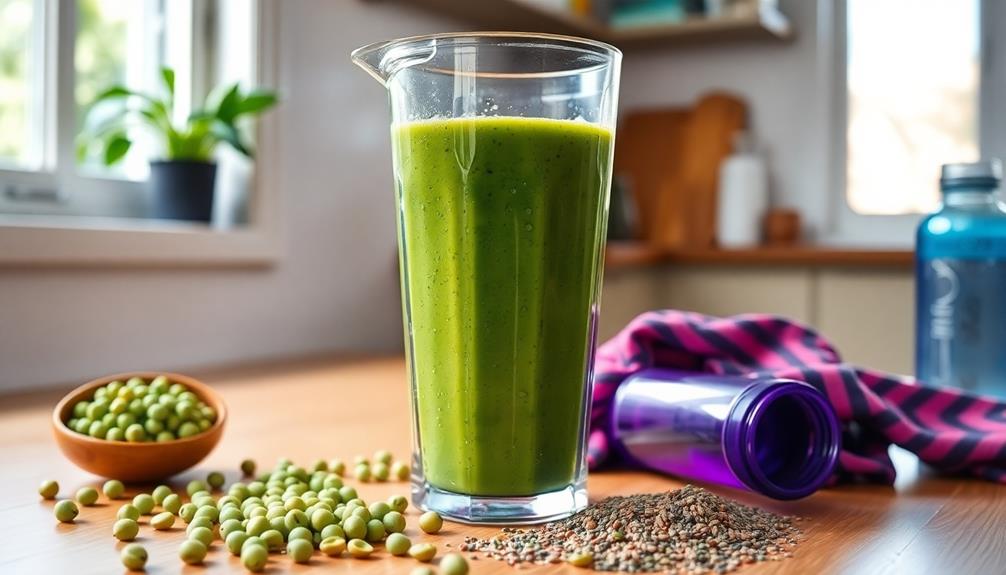
Plant protein powders are a great choice for vegans, vegetarians, or anyone who wants to try new protein sources. You can find powders made from peas, hemp, rice, and soy. Each one has its own mix of amino acids, which are the building blocks of protein. Adding mushroom extracts to plant protein powders may give extra benefits to endurance athletes. These mushrooms could help with recovery and boost the immune system.
When picking a plant protein powder, choose blends that mix different sources. This will give you a complete protein with all the essential amino acids your body needs to build and repair muscle. Many brands also add nutrients like vitamin B12 and iron, which can be low in plant-based diets.
To use the powder, just mix it with water or plant-based milk. You can also blend it into smoothies or use it in recipes for an extra protein kick.
Frequently Asked Questions
How Long After a Workout Should I Consume Protein for Optimal Muscle Repair?
You'll want to consume protein within 30 minutes to 2 hours after your workout for best muscle repair. This window, often called the "anabolic window," is when your body's most receptive to utilizing protein for recovery.
Can I Mix Different Types of Protein for Better Results?
Yes, you can mix different protein types for better results. Combining fast-absorbing proteins like whey with slower-digesting ones like casein can provide both immediate and sustained amino acid release, potentially enhancing muscle repair and growth throughout the day.
Are There Any Side Effects of Consuming Too Much Protein Post-Workout?
Yes, you can experience side effects from excessive post-workout protein intake. You might face digestive issues, dehydration, or kidney strain. It's also possible you'll gain unwanted weight if you're consuming more calories than you're burning.
How Does Age Affect Protein Requirements for Muscle Repair After Exercise?
As you age, you'll need more protein for muscle repair after exercise. Your body's ability to synthesize protein decreases, so you should increase your intake to maintain muscle mass and support recovery. Don't skimp on protein!
Should Protein Intake Differ for Cardio Versus Strength Training Workouts?
Yes, your protein intake should differ for cardio and strength training. You'll need more protein after strength training to repair and build muscle. For cardio, you'll require less protein, focusing more on replenishing energy stores.

